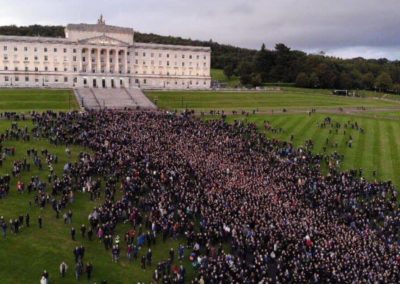A new poll has revealed that only 16% of the general population disagree that it should remain the case that a woman is breaking the law if she has an abortion of a healthy baby after the current 24-week legal time limit up until birth.
The results of this polling, conducted by Whitestone Insight of 2,011 people from across Britain, indicate that there is very little public support for proposals from MPs that would remove offences that make it illegal for a woman to perform a self-abortion at any point right through to birth.
Extreme abortion amendment retabled
Two Labour MPs, Diana Johnson and Stella Creasy, had each tabled amendments to the Government’s flagship Criminal Justice Bill, which were withdrawn last week at Committee stage. Johnson, however, has since retabled her amendment, which will be considered at Report stage.
Johnson’s amendment would create a situation whereby women can perform self-abortions with no deterrent regardless of any regulations that may be introduced for abortion providers. Her amendment would therefore mean abortion is de facto deregulated for women who acquire abortion pills either by misleading abortion providers or through other means, since they would be free to take the pills at any gestation, rendering regulations worthless.
Why was the abortion time limit reduced from 28 weeks to 24 weeks in 1990?
The introduction of a 24-week gestational limit in 1990 was significantly motivated by the results of a Royal College of Obstetricians and Gynaecologists (RCOG) working party report on neonatal survival rates before 28 weeks of gestation.
During the debates ahead of the Human Fertilisation and Embryology Act 1990 becoming law, a number of MPs specifically tied the abortion limit to the point at which a child is “capable of being born alive” and noted that this was the rationale for setting the 28-week limit in the Infant Life (Preservation) Act 1929.
Similarly, when the question of abortion time limits was revisited in 2008, the lowering of the abortion time limit in 1990 was again linked to the increased survival rates for babies born before 28 weeks gestation.
The current gestational limit for abortion of 24 weeks is already very late compared with other countries, and is at a point when the baby has already been fully formed for 12 weeks.
At 12 weeks gestation (the most common abortion time limit among countries in the EU), the NHS outlines that the unborn baby is fully formed. All the organs, muscles, limbs and bones are in place, and the sex organs are well developed. From then on, the baby just has to grow and mature.
At around 15 weeks gestation, the unborn baby will start to hear – they may hear muted sounds from the outside world, as well as the sound of their mother’s voice and heart. At 16 weeks gestation, the muscles of the unborn baby’s face can now move and the beginnings of facial expressions appear. At 18 weeks gestation, the unborn baby may respond to loud noises from the outside world, such as music. At 22 weeks gestation, the unborn baby is beginning to get into a pattern of sleeping and waking. At 23 weeks gestation, the unborn baby’s lungs are practising breathing movements to prepare for life outside the womb.
Spokesperson for Right To Life UK, Catherine Robinson, said “This recent polling indicates that the MPs behind these extreme abortion amendments are radically out of touch with public opinion on this matter”.
“Our abortion laws are already extremely permissive and even allow abortion up to the point of birth if the child is thought to have a disability. Stronger protections for unborn babies and their mothers need to be introduced, rather than the few remaining protections removed”.












